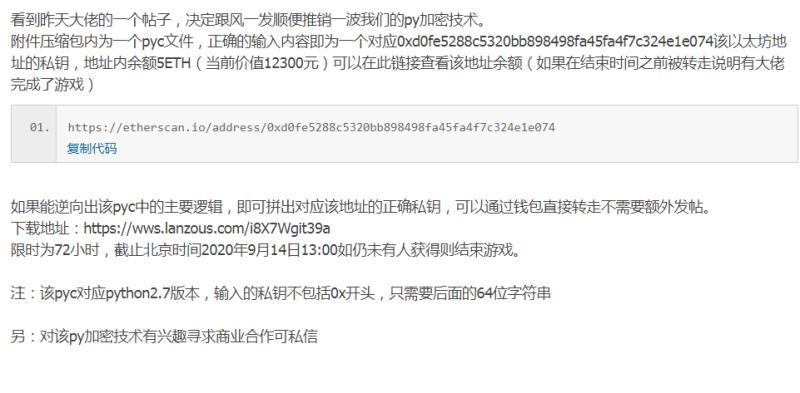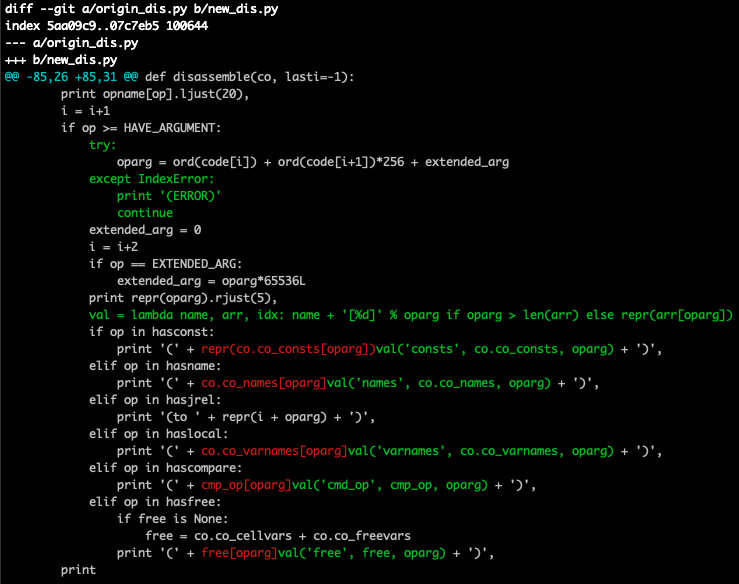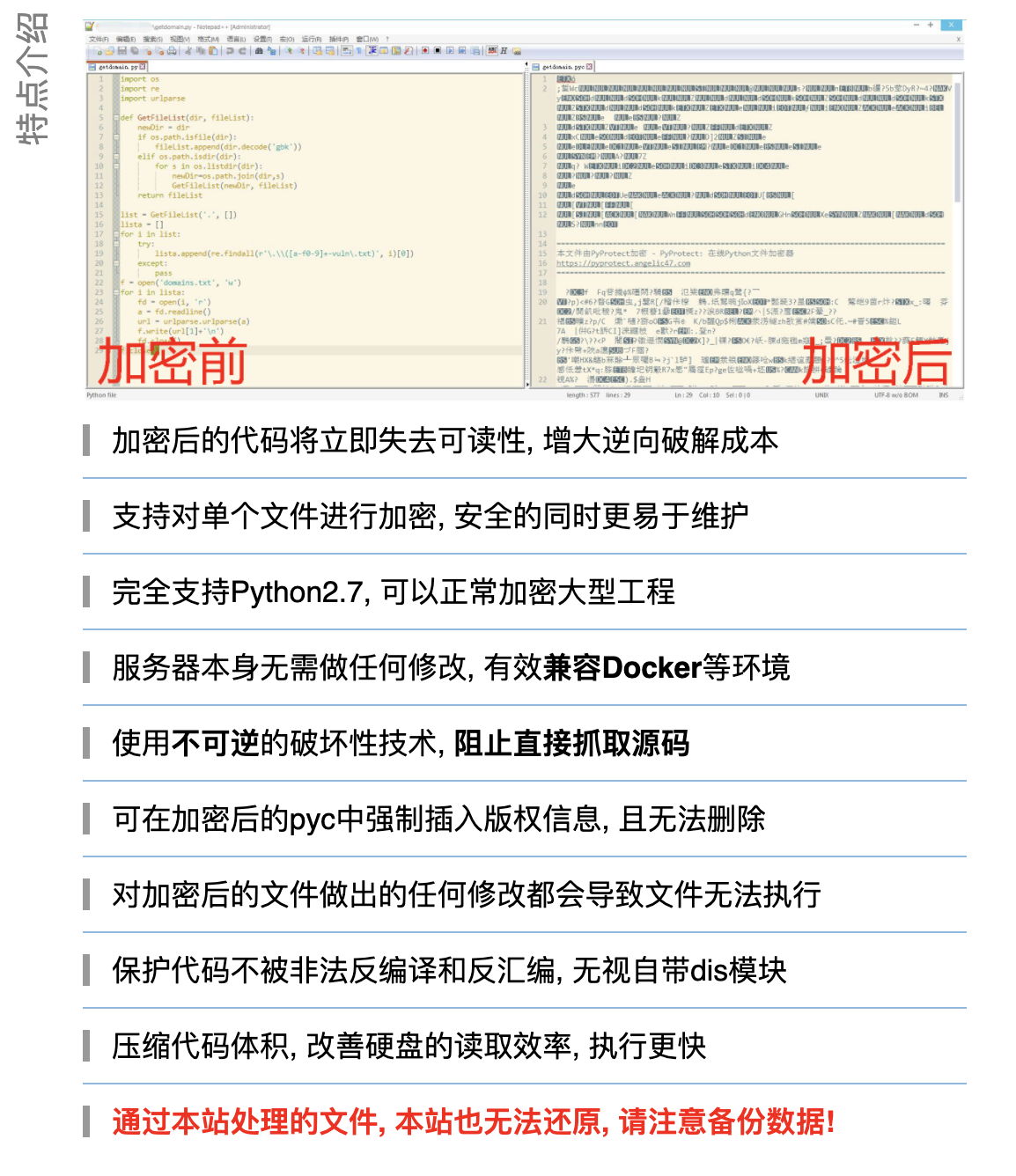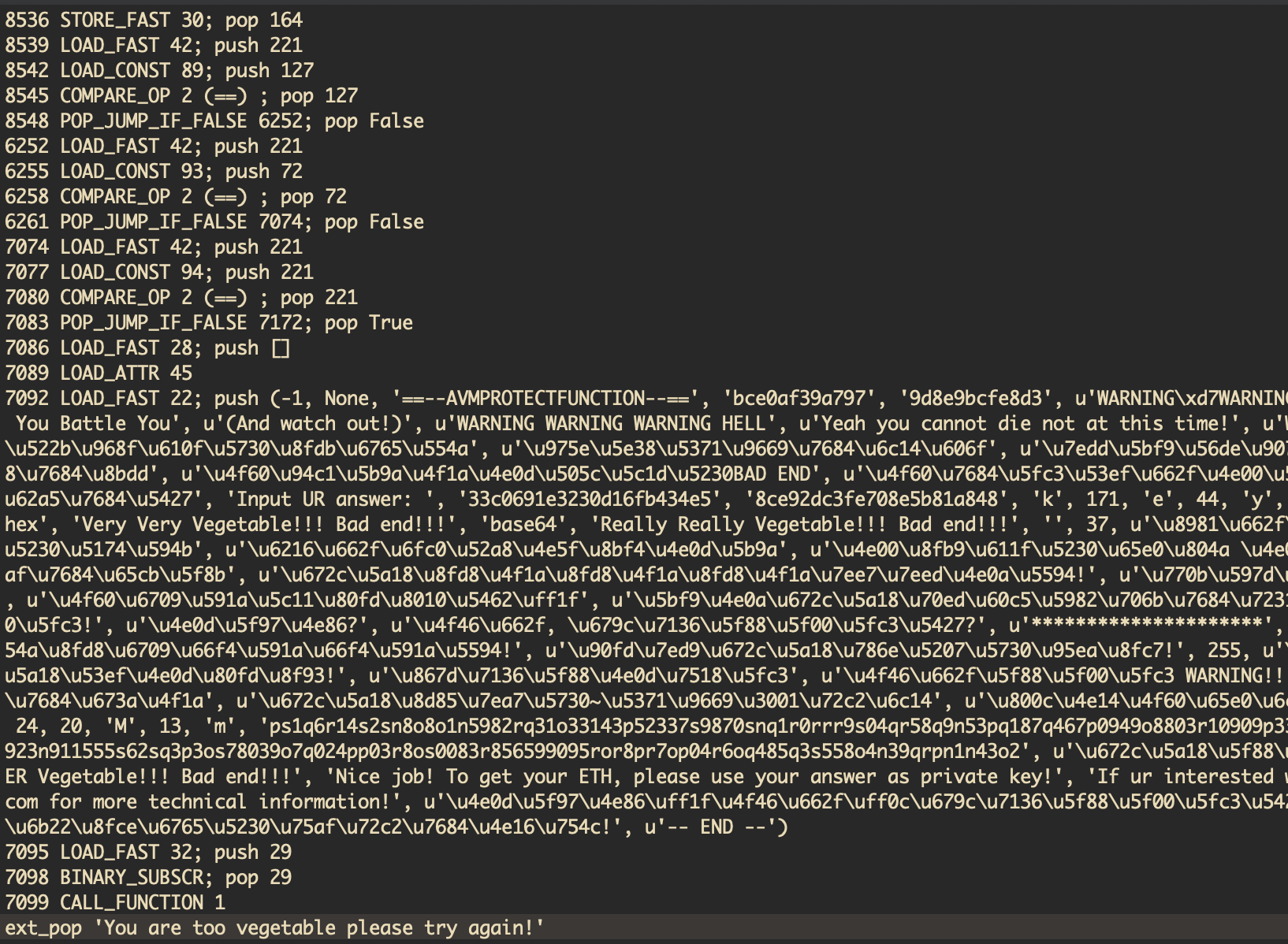某天在群里看到一个大佬看到另一个大佬的帖子而发的帖子的截图,如下所示:

不过当我看到的时候已经过去了大概720小时 在查看该以太币交易记录的时候,发现在充值之后十几小时就被提走了,可能是其他大佬也可能是作者自己。虽然没钱可偷,但幸运的是 pyc 的下载地址依然有效,所以我就下载下来研究了一下。
首先在专用的实验虚拟机里运行一下,程序执行没有问题:
然后看看文件里是否有对应的字符串信息:
很好,屁都没有,看来字符串也混淆了。
目前市面上有一些开源的 pyc 还原工具,比如:
但是看作者的自信,应该是有信心可以抗住的,事实证明也确实可以。
既然没有现成工具能用,那么我们就需要通过自己的方法来对代码逻辑进行还原。要分析代码逻辑第一步至少要把字节码还原出来,使用 dis 模块可以实现:
.pyc文件本身是字节码的marshal序列化格式,在 Python2.7 中加上 8 字节的 pyc 头信息。一般通过上面的代码即可打印出文件中的字节码信息。当然,这个事情并不一般:
在 dis 模块中直接异常退出了,有点意思。查看 dis 的源码,查看出错的部分,发现在 co.co_code、 co.co_names、 co.co_consts等多个地方都出现了下标溢出的IndexError。不管是什么原因,我们先把这些地方 patch 掉:

这回就能看到输出的 Python 字节码了,如下:
不过这些字节码的逻辑看起来很奇怪,看不出哪里奇怪不要紧,我们先来看看正常的 Python 字节码。
Python 是一种解释型语言,而 Python 字节码是一种平台无关的中间代码,由 Python 虚拟机动态(PVM)解释执行,这也是 Python 程序可以跨平台的原因。
看一个简单的例子test.py:
使用上面的反汇编程序打印出字节码如下:
能看懂英文的话,理解上面的代码应该也没有太大问题,不过值得注意的是有两个 LOAD_CONST 指令的参数本身也是代码,即dis.disassemble函数的参数,所以我们可以对其也进行反汇编:
结果如下:
上述打印的是 Python 字节码的伪代码,存储时还是二进制格式,这个在下一节说。上面的伪代码虽然大致能猜出意思, 但这并不是严谨的方法。实际上 Python 字节码在官方文档有比较详细的介绍,包括每个指令的含义以及参数。
注意: 字节码的实现和具体Python版本有关
对于常年进行二进制逆向的人而言,可以把 Python 字节码看做是一种特殊的指令集。对于一种指令集,我们实际上需要关心的是指令结构和调用约定。Python 虚拟机 PVM 是一种基于栈的虚拟机,参数也主要通过栈来进行传递,不过与传统 x86 的参数传递顺序相反,是从左到右进行传递的。
每条字节码由两部分组成:
其中opcde占1字节,即PVM支持最多256个类型的指令;
oparg占的空间和opcode有关,如果opcode带参数,即opcode > dis.HAVE_ARGUMENT,则oparg占2个字节;通常oparg表示在对应属性中的索引,比如LOAD_CONST指令的oparg就表示参数在co_consts数组中的索引。
在Python3中oparg占1个字节,所以再次提醒: 字节码的解析和具体Python版本有关
数组元素的数量是可变的,2字节最多只能表示65536个元素,要是超过这个值怎么办?答案就是 EXTENDED_ARG。这是个特殊的opcode,值为dis.EXTENDED_ARG,遇到这个 opcode 则表示下一条指令的参数值 next_oparg 值需要进行拓展:
当然EXTENDED_ARG是可以级联的,从而支持任意大小的参数值。
要查看某个 Python 函数的字节码,比如:
可以通过func.__code__获取。或者直接编译:
func.__code__和co都是下面的 CodeType 类型:
前面介绍的字节码,就是co_code中的内容。而字节码中的参数oparg则是在对应数组(Tuple)中的位置。了解 PVM 翻译字节码过程最好的方法就是参考 dis 模块中的反汇编函数:
其中hasconst、hashname都是定义在opcode模块中的数组,包含对应字节码指令的参数类型,比如LOAD_CONST指令就包含在hasconst数组中,这只是一种方便的写法。
通过字节码基本上能还原出原始代码的逻辑,即还原出可阅读的反汇编代码;如果要更进一步,反编译出原始的 Python 代码也是可以的,因为 CodeType 对象中已经有了足够多的信息。
因此,出于保护的目的,就有了针对 python 代码的安全加固的需求,一般而言 python 代码加固有以下几种:
对于我们的目标而言,显然是第二种加固方法,因为输出的 pyc 文件可以在标准的 Python2.7 解释器中运行。查看直接反汇编的字节码,可以明显看出对抗的痕迹:
内部使用了许多跳转指令,并在期间插入各种无效指令,这也是标准的反编译模块会崩溃退出的原因之一。既然无法使用静态分析,那么动态调试就是一个直观的方案,因为 Python 作为一个解释执行的语言,所有字节码最终都是需要通过 PVM 虚拟机去解释的。
为了分析 Python 如何解释执行字节码,我下载了默认的解释器 CPython 源码进行分析。首先从 PyEval_EvalCode 函数为入口找起:
经过漫长的调用链:
最终来到执行的函数_PyEval_EvalFrameDefault,该函数大约有 3000 行 C 代码,并且其中大量使用了宏来加速运算。前面说过 Python 字节码是基于栈的,这里的 Frame 就是指代某个栈帧,也就是当前执行流的上下文。栈帧中包括字节码、全局变量、本地变量等信息,如下所示:
这里的PyCodeObject就是字节码对象,和 dis 模块中的对象类似:
回到(默认的)eval_frame函数,抽取一些关键部分如下:
大部分的代码是对字节码中的 opcode 进行 switch/case 处理,上面截取了几个提到的字节码,比如 LOAD_CONST、JUMP_ABSOLUTE、BINARY_MULTIPLY、EXTENDED_ARG 等,根据代码的执行流程大概知道了 Python 解释器如何对这些字节码进行理解。
在 switch 语句之前有部分代码值得注意,即关于c_tracefunc的处理。从代码中看出,Python实际上内置了追踪字节码的功能。我们可以使用 sys.settrace 来设置跟踪函数,下面是一个简单的例子:
输出如下:
Python 的标准库中也提供了 trace 模块 来支持字节码跟踪,查看该模块的的源码发现实际上也是用了 sys.settrace 或者 threading.settrace 来设置跟踪回调。
不过,使用 sys.trace 并不是每条指令都跟踪的,只针对特定事件进行跟踪:
而且该代码中也做了对应的防护,使用 trace 启动脚本直接报错:
Python 的 trace 功能可以用来实现行覆盖率以及调试器等强大的功能,只是对于我们这次的目标并不适用。
类似的回调还有 c_profilefunc ,不过该函数不对 line 事件进行触发。
Python 有一个鲜为人知的特性是可以在 Debug 编译时启用底层跟踪 LLTRACE (即 Low Level Trace),这也是在查看 ceval.c 时发现的:
Low Level Trace 一方面需要编译时启用,另一方面也需要在运行时当前栈帧定义了全局变量__lltrace__。
还是实践出真知,先写个简单的测试文件:
使用 Debug 编译的 Python 运行结果如下:
打印的数字从下面的代码而来:
其中 push/pop 相关的输出来源是如下栈追踪相关的函数:
上面的 lltrace 输出可以记录每条字节码的执行,并且会打印堆栈的变化,因此在追踪和调试字节码上非常有用。
更多 LLTRACE 相关内容见: a59K9s2c8@1M7s2y4Q4x3@1q4Q4x3V1k6Q4x3V1k6Y4K9i4c8Z5N6h3u0Q4x3X3g2U0L8$3#2Q4x3V1k6H3P5i4c8Z5L8$3&6Q4x3V1k6U0M7s2W2@1K9r3!0F1i4K6u0r3j5X3I4G2j5W2)9J5c8X3#2S2M7%4c8W2M7W2)9J5c8V1#2A6M7$3y4Q4x3V1k6e0M7r3g2U0K9h3q4D9b7Y4g2A6L8r3c8K6i4K6u0W2N6s2S2@1
现在有了 LLTRACE 的功能,但是要实现 ether_v2.py 的追踪还需要解决几个问题:
所以我使用了一个简单粗暴的方法,即直接修改 CPython 源代码。首先在判断 lltrace 启用的地方修改判断从f->f_globals 改为递归搜索 f->f_back->f_globals,这样只要在我们的调用栈帧定义变量即可;对于字节码的输出,最好是可以有类似 dis 模块的显示效果,至于平坦化的控制流,可以根据指令 index 再重新进行组合。
在 LLTRACE 的基础上,我们可以比较简单地修改出一版具有可读性的 Trace 代码,以下面的源码为例:
其中__pztrace__是我新定义的全局跟踪触发标记,在没有源码的前提下,运行上述字节码可实时打印字节码如下:
将每条字节码后对应的栈操作以及实时数据输出,更加有利于对代码的理解。从上面的字节码输出中可以基本看出实际的操作,而且打印出来的是已经执行到的分支,通过调整输入可以触达不同的分支,如下为输入abab的跟踪流程:
由于是实时跟踪,因此上面的字节码是循环展开之后的。对于不熟悉的字节码,比如FOR_ITER等,可以辅助参考Python dis 模块的解释加以理解。
回到我们最初的挑战,使用修改后的 trace 功能去跟踪ether_v2.pyc,结果如下:
前面一部分和之前直接使用修改过的 dis 模块反编译结果类似,只不过跳过了中间的垃圾代码。其中co->co_filename的名称是pyprotect.angelic47.com,访问一下发现正是提供 Python 加密的网页:

介绍上基本和前面的分析吻合,这里先把这个网站放一边,继续往下看代码。由于运行时用户输入,然后返回You are too vegetable please try again!,因此直接搜索此字符串:
这里在指令6123的判断中判断为True导致跳转到了错误提示打印的分支,反向分析该字符串的来源,如下所示:

该加密流程将字符串本身也在内存中解密,因此我们静态搜索无法搜到相关的字节码逻辑,解密后内存中的字符串表如下所示:
注意打印日志中只输出了目前为止所运行到的代码,也就是说对于未触及的分支是不显示在其中的。为了增加覆盖率,触达新的分支,就需要改变上面的上面执行分支:
即需要执行到这里的时候字符串表的索引不是29,进而决定前面指令中STORE_FAST 32的结果不能是29,……根据对输入字符串的处理,可以猜测输入的总长度需要是64字节,验证一下:
确实产生了不同的输出。继续往前分析,可以大概梳理出判断的逻辑,所幸关键代码不是很复杂,手动还原伪代码如下所示:
关键逻辑就是以下几步:
由于每组求md5只需要8字节的求解空间,因此可以在很快的时间内进行爆破获取到原始的正确输入,最终的正确输入即是题干所给的以太坊钱包私钥。
以太坊的私钥长度和比特币一样是256位的随机数,其值需要小于 secp256k1 椭圆曲线的阶 n (值为ffffffff ffffffff ffffffff fffffffe baaedce6 af48a03b bfd25e8c d0364141),可以使用 go-ethereum 或者 ethereumjs 等开源实现来生成和验证合法的钱包公私钥。
d0fe5288c5320bb898498fa45fa4f7c324e1e074 正是题目所给的以太坊钱包地址,然后直接用私钥转账即可。
由于接触 Python 虚拟机不多,因此在阅读理解字节码上颇为花费了一点时间。从加固的代码模式来看,该加固工具应该是自己实现并维护了一个用户态的虚拟机,名为AVMP,确实是可以比较有效地防止无脑逆向工程,提高逆向难度。只不过由于 Python 的解释性特性使得代码加固很难得到有效混淆,因此一般商业化的 Python 加固都是直接将深度定制的 Python 解释器一起打包作为输出,不兼容标准解释器。值得一提的是,该 Python 虚拟机加固还实现了变量混淆、反调试等功能,完成度可以说相当高了;另外其作者自称47娘 (angelic47),似乎还是个女生,真是巾帼不让须眉啊。
虚拟机加固(VMP)是当今很常见的一种代码保护方案,不管是 X86 机器码(汇编),安卓的 DEX 字节码还是 Python 字节码,其本质上是从处理器中抢活干,自身在用户空间实现代码执行的状态机,有的还自己实现一套中间指令集。正如伟人所说 —— 世上本没有 VMP,对抗得深了,自然就成了 VMP。
欢迎技术交流和分享
公众号: 有价值炮灰
$ python2 ether_v2.pyc
Input UR answer: whatever
You are too vegetable please try again!
$ python2 ether_v2.pyc
Input UR answer: whatever
You are too vegetable please try again!
$ grep vegetable ether_v2.pyc
$ grep vegetable ether_v2.pyc
import dis
import marshal
with open('ether_v2.pyc', 'rb') as f:
magic = f.read(4)
timestamp = f.read(4)
code = marshal.load(f)
dis.disassemble(code)
import dis
import marshal
with open('ether_v2.pyc', 'rb') as f:
magic = f.read(4)
timestamp = f.read(4)
code = marshal.load(f)
dis.disassemble(code)
$ python2 try1.py
Traceback (most recent call last):
File "try1.py", line 9, in <module>
dis.disassemble(code)
File "/usr/lib/python2.7/dis.py", line 64, in disassemble
labels = findlabels(code)
File "/usr/lib/python2.7/dis.py", line 166, in findlabels
oparg = ord(code[i]) + ord(code[i+1])*256
IndexError: string index out of range
$ python2 try1.py
Traceback (most recent call last):
File "try1.py", line 9, in <module>
dis.disassemble(code)
File "/usr/lib/python2.7/dis.py", line 64, in disassemble
labels = findlabels(code)
File "/usr/lib/python2.7/dis.py", line 166, in findlabels
oparg = ord(code[i]) + ord(code[i+1])*256
IndexError: string index out of range
$ ./dec.py --pyc ether_v2.pyc
3 0 JUMP_ABSOLUTE 2764
3 LOAD_CONST 65535 (consts[65535])
6 <218> 50673
9 SET_ADD 18016
12 IMPORT_NAME 8316 (names[8316])
15 STOP_CODE
16 LOAD_CONST 33 (8)
19 COMPARE_OP 2 ('==')
22 POP_JUMP_IF_FALSE 99
25 LOAD_FAST 28 ('/ * && ')
28 LOAD_ATTR 45 ('append')
31 LOAD_FAST 9 ('with ^ raise ')
34 LOAD_FAST 44 ('with as - 6 lambda ')
37 COMPARE_OP 8 ('is')
40 CALL_FUNCTION 1
43 POP_TOP
44 JUMP_FORWARD 8559 (to 8606)
...
$ ./dec.py --pyc ether_v2.pyc
3 0 JUMP_ABSOLUTE 2764
3 LOAD_CONST 65535 (consts[65535])
6 <218> 50673
9 SET_ADD 18016
12 IMPORT_NAME 8316 (names[8316])
15 STOP_CODE
16 LOAD_CONST 33 (8)
19 COMPARE_OP 2 ('==')
22 POP_JUMP_IF_FALSE 99
25 LOAD_FAST 28 ('/ * && ')
28 LOAD_ATTR 45 ('append')
31 LOAD_FAST 9 ('with ^ raise ')
34 LOAD_FAST 44 ('with as - 6 lambda ')
37 COMPARE_OP 8 ('is')
40 CALL_FUNCTION 1
43 POP_TOP
44 JUMP_FORWARD 8559 (to 8606)
...
def add(a, b):
return a - b + 42
def main():
b = add(3, 4)
c = add(b, 5)
result = 'evilpan: ' + str(c)
print result
if __name__ == '__main__':
main()
def add(a, b):
return a - b + 42
def main():
b = add(3, 4)
c = add(b, 5)
result = 'evilpan: ' + str(c)
print result
if __name__ == '__main__':
main()
$ ./dec.py --pyc test.pyc
3 0 LOAD_CONST 0 (<code object add at 0x7f02ee26f5b0, file "test.py", line 3>)
3 MAKE_FUNCTION 0
6 STORE_NAME 0 ('add')
6 9 LOAD_CONST 1 (<code object main at 0x7f02ee26ff30, file "test.py", line 6>)
12 MAKE_FUNCTION 0
15 STORE_NAME 1 ('main')
12 18 LOAD_NAME 2 ('__name__')
21 LOAD_CONST 2 ('__main__')
24 COMPARE_OP 2 ('==')
27 POP_JUMP_IF_FALSE 40
13 30 LOAD_NAME 1 ('main')
33 CALL_FUNCTION 0
36 POP_TOP
37 JUMP_FORWARD 0 (to 40)
>> 40 LOAD_CONST 3 (None)
43 RETURN_VALUE
$ ./dec.py --pyc test.pyc
3 0 LOAD_CONST 0 (<code object add at 0x7f02ee26f5b0, file "test.py", line 3>)
3 MAKE_FUNCTION 0
6 STORE_NAME 0 ('add')
6 9 LOAD_CONST 1 (<code object main at 0x7f02ee26ff30, file "test.py", line 6>)
12 MAKE_FUNCTION 0
15 STORE_NAME 1 ('main')
12 18 LOAD_NAME 2 ('__name__')
21 LOAD_CONST 2 ('__main__')
24 COMPARE_OP 2 ('==')
27 POP_JUMP_IF_FALSE 40
13 30 LOAD_NAME 1 ('main')
33 CALL_FUNCTION 0
36 POP_TOP
37 JUMP_FORWARD 0 (to 40)
>> 40 LOAD_CONST 3 (None)
43 RETURN_VALUE
dis.disassemble(code)
print("=== 0 ===")
dis.disassemble(code.co_consts[0])
print("=== 1 ===")
dis.disassemble(code.co_consts[1])
dis.disassemble(code)
print("=== 0 ===")
dis.disassemble(code.co_consts[0])
print("=== 1 ===")
dis.disassemble(code.co_consts[1])
=== 0 ===
4 0 LOAD_FAST 0 ('a')
3 LOAD_FAST 1 ('b')
6 BINARY_SUBTRACT
7 LOAD_CONST 1 (42)
10 BINARY_ADD
11 RETURN_VALUE
=== 1 ===
7 0 LOAD_GLOBAL 0 ('add')
3 LOAD_CONST 1 (3)
6 LOAD_CONST 2 (4)
9 CALL_FUNCTION 2
12 STORE_FAST 0 ('b')
8 15 LOAD_GLOBAL 0 ('add')
18 LOAD_FAST 0 ('b')
21 LOAD_CONST 3 (5)
24 CALL_FUNCTION 2
27 STORE_FAST 1 ('c')
9 30 LOAD_CONST 4 ('evilpan: ')
33 LOAD_GLOBAL 1 ('str')
36 LOAD_FAST 1 ('c')
39 CALL_FUNCTION 1
42 BINARY_ADD
43 STORE_FAST 2 ('result')
10 46 LOAD_FAST 2 ('result')
49 PRINT_ITEM
50 PRINT_NEWLINE
51 LOAD_CONST 0 (None)
54 RETURN_VALUE
=== 0 ===
4 0 LOAD_FAST 0 ('a')
3 LOAD_FAST 1 ('b')
6 BINARY_SUBTRACT
7 LOAD_CONST 1 (42)
10 BINARY_ADD
11 RETURN_VALUE
=== 1 ===
7 0 LOAD_GLOBAL 0 ('add')
3 LOAD_CONST 1 (3)
6 LOAD_CONST 2 (4)
9 CALL_FUNCTION 2
12 STORE_FAST 0 ('b')
8 15 LOAD_GLOBAL 0 ('add')
18 LOAD_FAST 0 ('b')
21 LOAD_CONST 3 (5)
24 CALL_FUNCTION 2
27 STORE_FAST 1 ('c')
9 30 LOAD_CONST 4 ('evilpan: ')
33 LOAD_GLOBAL 1 ('str')
36 LOAD_FAST 1 ('c')
39 CALL_FUNCTION 1
42 BINARY_ADD
43 STORE_FAST 2 ('result')
10 46 LOAD_FAST 2 ('result')
49 PRINT_ITEM
50 PRINT_NEWLINE
51 LOAD_CONST 0 (None)
54 RETURN_VALUE
opcode + oparg
extented_arg = oparg * 65536
next_oparg = next_oparg + extended_arg
extented_arg = oparg * 65536
next_oparg = next_oparg + extended_arg
def func(a):
return a + 42
def func(a):
return a + 42
c = "a = 3; b = 4; c = a + b"
co = compile(c, "", "exec")
c = "a = 3; b = 4; c = a + b"
co = compile(c, "", "exec")
class CodeType:
co_argcount: int
co_cellvars: Tuple[str, ...]
co_code: str
co_consts: Tuple[Any, ...]
co_filename: str
co_firstlineno: int
co_flags: int
co_freevars: Tuple[str, ...]
co_lnotab: str
co_name: str
co_names: Tuple[str, ...]
co_nlocals: int
co_stacksize: int
co_varnames: Tuple[str, ...]
class CodeType:
co_argcount: int
co_cellvars: Tuple[str, ...]
co_code: str
co_consts: Tuple[Any, ...]
co_filename: str
co_firstlineno: int
co_flags: int
co_freevars: Tuple[str, ...]
co_lnotab: str
co_name: str
co_names: Tuple[str, ...]
co_nlocals: int
co_stacksize: int
co_varnames: Tuple[str, ...]
def disassemble(co, lasti=-1):
code = co.co_code
labels = findlabels(code)
linestarts = dict(findlinestarts(co))
n = len(code)
i = 0
extended_arg = 0
free = None
while i < n:
c = code[i]
op = ord(c)
if i in linestarts:
if i > 0:
print
print "%3d" % linestarts[i],
else:
print ' ',
if i == lasti: print '-->',
else: print ' ',
if i in labels: print '>>',
else: print ' ',
print repr(i).rjust(4),
print opname[op].ljust(20),
i = i+1
if op >= HAVE_ARGUMENT:
oparg = ord(code[i]) + ord(code[i+1])*256 + extended_arg
extended_arg = 0
i = i+2
if op == EXTENDED_ARG:
extended_arg = oparg*65536L
print repr(oparg).rjust(5),
if op in hasconst:
print '(' + repr(co.co_consts[oparg]) + ')',
elif op in hasname:
print '(' + co.co_names[oparg] + ')',
elif op in hasjrel:
print '(to ' + repr(i + oparg) + ')',
elif op in haslocal:
print '(' + co.co_varnames[oparg] + ')',
elif op in hascompare:
print '(' + cmp_op[oparg] + ')',
elif op in hasfree:
if free is None:
free = co.co_cellvars + co.co_freevars
print '(' + free[oparg] + ')',
print
def disassemble(co, lasti=-1):
code = co.co_code
labels = findlabels(code)
linestarts = dict(findlinestarts(co))
n = len(code)
i = 0
extended_arg = 0
free = None
while i < n:
c = code[i]
op = ord(c)
if i in linestarts:
if i > 0:
print
print "%3d" % linestarts[i],
else:
print ' ',
if i == lasti: print '-->',
else: print ' ',
if i in labels: print '>>',
else: print ' ',
print repr(i).rjust(4),
print opname[op].ljust(20),
i = i+1
if op >= HAVE_ARGUMENT:
oparg = ord(code[i]) + ord(code[i+1])*256 + extended_arg
extended_arg = 0
i = i+2
if op == EXTENDED_ARG:
extended_arg = oparg*65536L
print repr(oparg).rjust(5),
if op in hasconst:
print '(' + repr(co.co_consts[oparg]) + ')',
elif op in hasname:
print '(' + co.co_names[oparg] + ')',
elif op in hasjrel:
print '(to ' + repr(i + oparg) + ')',
elif op in haslocal:
print '(' + co.co_varnames[oparg] + ')',
elif op in hascompare:
print '(' + cmp_op[oparg] + ')',
elif op in hasfree:
if free is None:
free = co.co_cellvars + co.co_freevars
print '(' + free[oparg] + ')',
print
3 0 JUMP_ABSOLUTE 2764
3 LOAD_CONST 65535 (consts[65535])
6 <218> 50673
9 SET_ADD 18016
3 0 JUMP_ABSOLUTE 2764
3 LOAD_CONST 65535 (consts[65535])
6 <218> 50673
9 SET_ADD 18016
PyObject *
PyEval_EvalCode(PyObject *co, PyObject *globals, PyObject *locals)
{
return PyEval_EvalCodeEx(co,
globals, locals,
(PyObject **)NULL, 0,
(PyObject **)NULL, 0,
(PyObject **)NULL, 0,
NULL, NULL);
}
PyObject *
PyEval_EvalCode(PyObject *co, PyObject *globals, PyObject *locals)
{
return PyEval_EvalCodeEx(co,
globals, locals,
(PyObject **)NULL, 0,
(PyObject **)NULL, 0,
(PyObject **)NULL, 0,
NULL, NULL);
}
struct _frame {
PyObject_VAR_HEAD
struct _frame *f_back; /* previous frame, or NULL */
PyCodeObject *f_code; /* code segment */
PyObject *f_builtins; /* builtin symbol table (PyDictObject) */
PyObject *f_globals; /* global symbol table (PyDictObject) */
PyObject *f_locals; /* local symbol table (any mapping) */
PyObject **f_valuestack; /* points after the last local */
PyObject *f_trace; /* Trace function */
int f_stackdepth; /* Depth of value stack */
char f_trace_lines; /* Emit per-line trace events? */
char f_trace_opcodes; /* Emit per-opcode trace events? */
/* Borrowed reference to a generator, or NULL */
PyObject *f_gen;
int f_lasti; /* Last instruction if called */
/* Call PyFrame_GetLineNumber() instead of reading this field
directly. As of 2.3 f_lineno is only valid when tracing is
active (i.e. when f_trace is set). At other times we use
PyCode_Addr2Line to calculate the line from the current
bytecode index. */
int f_lineno; /* Current line number */
int f_iblock; /* index in f_blockstack */
PyFrameState f_state; /* What state the frame is in */
PyTryBlock f_blockstack[CO_MAXBLOCKS]; /* for try and loop blocks */
PyObject *f_localsplus[1]; /* locals+stack, dynamically sized */
};
struct _frame {
PyObject_VAR_HEAD
struct _frame *f_back; /* previous frame, or NULL */
PyCodeObject *f_code; /* code segment */
PyObject *f_builtins; /* builtin symbol table (PyDictObject) */
PyObject *f_globals; /* global symbol table (PyDictObject) */
PyObject *f_locals; /* local symbol table (any mapping) */
PyObject **f_valuestack; /* points after the last local */
PyObject *f_trace; /* Trace function */
int f_stackdepth; /* Depth of value stack */
char f_trace_lines; /* Emit per-line trace events? */
char f_trace_opcodes; /* Emit per-opcode trace events? */
/* Borrowed reference to a generator, or NULL */
PyObject *f_gen;
int f_lasti; /* Last instruction if called */
/* Call PyFrame_GetLineNumber() instead of reading this field
directly. As of 2.3 f_lineno is only valid when tracing is
active (i.e. when f_trace is set). At other times we use
PyCode_Addr2Line to calculate the line from the current
bytecode index. */
int f_lineno; /* Current line number */
int f_iblock; /* index in f_blockstack */
PyFrameState f_state; /* What state the frame is in */
PyTryBlock f_blockstack[CO_MAXBLOCKS]; /* for try and loop blocks */
PyObject *f_localsplus[1]; /* locals+stack, dynamically sized */
};
/* Bytecode object */
struct PyCodeObject {
PyObject_HEAD
int co_argcount; /*
int co_posonlyargcount; /*
int co_kwonlyargcount; /*
int co_nlocals; /*
int co_stacksize; /*
int co_flags; /* CO_..., see below */
int co_firstlineno; /* first source line number */
PyObject *co_code; /* instruction opcodes */
PyObject *co_consts; /* list (constants used) */
PyObject *co_names; /* list of strings (names used) */
PyObject *co_varnames; /* tuple of strings (local variable names) */
PyObject *co_freevars; /* tuple of strings (free variable names) */
PyObject *co_cellvars; /* tuple of strings (cell variable names) */
/* The rest aren't used in either hash or comparisons, except for co_name,
used in both. This is done to preserve the name and line number
for tracebacks and debuggers; otherwise, constant de-duplication
would collapse identical functions/lambdas defined on different lines.
*/
Py_ssize_t *co_cell2arg; /* Maps cell vars which are arguments. */
PyObject *co_filename; /* unicode (where it was loaded from) */
PyObject *co_name; /* unicode (name, for reference) */
PyObject *co_lnotab; /* string (encoding addr<->lineno mapping) See
Objects/lnotab_notes.txt for details. */
// ...
}
/* Bytecode object */
struct PyCodeObject {
PyObject_HEAD
int co_argcount; /*
int co_posonlyargcount; /*
int co_kwonlyargcount; /*
int co_nlocals; /*
int co_stacksize; /*
int co_flags; /* CO_..., see below */
int co_firstlineno; /* first source line number */
PyObject *co_code; /* instruction opcodes */
PyObject *co_consts; /* list (constants used) */
PyObject *co_names; /* list of strings (names used) */
PyObject *co_varnames; /* tuple of strings (local variable names) */
PyObject *co_freevars; /* tuple of strings (free variable names) */
PyObject *co_cellvars; /* tuple of strings (cell variable names) */
/* The rest aren't used in either hash or comparisons, except for co_name,
used in both. This is done to preserve the name and line number
for tracebacks and debuggers; otherwise, constant de-duplication
would collapse identical functions/lambdas defined on different lines.
*/
Py_ssize_t *co_cell2arg; /* Maps cell vars which are arguments. */
PyObject *co_filename; /* unicode (where it was loaded from) */
PyObject *co_name; /* unicode (name, for reference) */
PyObject *co_lnotab; /* string (encoding addr<->lineno mapping) See
Objects/lnotab_notes.txt for details. */
// ...
}
PyObject* _Py_HOT_FUNCTION
_PyEval_EvalFrameDefault(PyThreadState *tstate, PyFrameObject *f, int throwflag)
{
//...
if (tstate->use_tracing) {
if (tstate->c_tracefunc != NULL) {
if (call_trace_protected(tstate->c_tracefunc,
tstate->c_traceobj,
tstate, f, PyTrace_CALL, Py_None)) {
/* Trace function raised an error */
goto exit_eval_frame;
}
}
}
// ...
first_instr = (_Py_CODEUNIT *) PyBytes_AS_STRING(co->co_code);
next_instr = first_instr;
// ...
main_loop:
for (;;) {
assert(stack_pointer >= f->f_valuestack); /* else underflow */
assert(STACK_LEVEL() <= co->co_stacksize); /* else overflow */
assert(!_PyErr_Occurred(tstate));
fast_next_opcode:
if (PyDTrace_LINE_ENABLED())
maybe_dtrace_line(f, &instr_lb, &instr_ub, &instr_prev);
/* line-by-line tracing support */
if (trace...) {
err = maybe_call_line_trace(tstate->c_tracefunc,
tstate->c_traceobj,
tstate, f,
&instr_lb, &instr_ub, &instr_prev);
}
dispatch_opcode:
// ...
switch (opcode) {
case TARGET(NOP): {
FAST_DISPATCH();
}
case TARGET(LOAD_FAST): {/*...*/}
case TARGET(LOAD_CONST): {
PREDICTED(LOAD_CONST);
PyObject *value = GETITEM(consts, oparg);
Py_INCREF(value);
PUSH(value);
FAST_DISPATCH();
}
case TARGET(STORE_FAST): {/*...*/}
case TARGET(POP_TOP): {/*...*/}
// ...
case TARGET(BINARY_MULTIPLY): {
PyObject *right = POP();
PyObject *left = TOP();
PyObject *res = PyNumber_Multiply(left, right);
Py_DECREF(left);
Py_DECREF(right);
SET_TOP(res);
if (res == NULL)
goto error;
DISPATCH();
}
// ...
case TARGET(JUMP_ABSOLUTE): {
PREDICTED(JUMP_ABSOLUTE);
JUMPTO(oparg);
/* Enabling this path speeds-up all while and for-loops by bypassing
the per-loop checks for signals. By default, this should be turned-off
because it prevents detection of a control-break in tight loops like
"while 1: pass". Compile with this option turned-on when you need
the speed-up and do not need break checking inside tight loops (ones
that contain only instructions ending with FAST_DISPATCH).
*/
FAST_DISPATCH();
DISPATCH();
}
// ...
case TARGET(EXTENDED_ARG): {
int oldoparg = oparg;
NEXTOPARG();
oparg |= oldoparg << 8;
goto dispatch_opcode;
}
// ...
// switch end
}
/* This should never be reached. Every opcode should end with DISPATCH()
or goto error. */
Py_UNREACHABLE();
error:
// ...
exception_unwind:
// ...
exiting:
// ...
}
}
/* pop frame */
exit_eval_frame:
// ...
return _Py_CheckFunctionResult(tstate, NULL, retval, __func__);
}
PyObject* _Py_HOT_FUNCTION
_PyEval_EvalFrameDefault(PyThreadState *tstate, PyFrameObject *f, int throwflag)
{
//...
if (tstate->use_tracing) {
if (tstate->c_tracefunc != NULL) {
if (call_trace_protected(tstate->c_tracefunc,
tstate->c_traceobj,
tstate, f, PyTrace_CALL, Py_None)) {
/* Trace function raised an error */
goto exit_eval_frame;
}
}
}
// ...
first_instr = (_Py_CODEUNIT *) PyBytes_AS_STRING(co->co_code);
next_instr = first_instr;
// ...
main_loop:
for (;;) {
assert(stack_pointer >= f->f_valuestack); /* else underflow */
assert(STACK_LEVEL() <= co->co_stacksize); /* else overflow */
assert(!_PyErr_Occurred(tstate));
fast_next_opcode:
if (PyDTrace_LINE_ENABLED())
maybe_dtrace_line(f, &instr_lb, &instr_ub, &instr_prev);
/* line-by-line tracing support */
if (trace...) {
err = maybe_call_line_trace(tstate->c_tracefunc,
tstate->c_traceobj,
tstate, f,
&instr_lb, &instr_ub, &instr_prev);
}
dispatch_opcode:
// ...
switch (opcode) {
case TARGET(NOP): {
FAST_DISPATCH();
}
case TARGET(LOAD_FAST): {/*...*/}
case TARGET(LOAD_CONST): {
PREDICTED(LOAD_CONST);
PyObject *value = GETITEM(consts, oparg);
Py_INCREF(value);
PUSH(value);
FAST_DISPATCH();
}
case TARGET(STORE_FAST): {/*...*/}
case TARGET(POP_TOP): {/*...*/}
// ...
case TARGET(BINARY_MULTIPLY): {
PyObject *right = POP();
PyObject *left = TOP();
PyObject *res = PyNumber_Multiply(left, right);
Py_DECREF(left);
Py_DECREF(right);
SET_TOP(res);
if (res == NULL)
goto error;
DISPATCH();
}
// ...
case TARGET(JUMP_ABSOLUTE): {
PREDICTED(JUMP_ABSOLUTE);
JUMPTO(oparg);
/* Enabling this path speeds-up all while and for-loops by bypassing
the per-loop checks for signals. By default, this should be turned-off
because it prevents detection of a control-break in tight loops like
"while 1: pass". Compile with this option turned-on when you need
the speed-up and do not need break checking inside tight loops (ones
that contain only instructions ending with FAST_DISPATCH).
*/
FAST_DISPATCH();
DISPATCH();
}
// ...
case TARGET(EXTENDED_ARG): {
int oldoparg = oparg;
NEXTOPARG();
oparg |= oldoparg << 8;
goto dispatch_opcode;
}
// ...
// switch end
}
/* This should never be reached. Every opcode should end with DISPATCH()
or goto error. */
Py_UNREACHABLE();
error:
// ...
exception_unwind:
// ...
exiting:
// ...
}
}
/* pop frame */
exit_eval_frame:
// ...
return _Py_CheckFunctionResult(tstate, NULL, retval, __func__);
}
import sys
import dis
def func(a, b):
c = a + b
return c * 10
co = func.__code__
dis.disassemble(co)
def mytrace(frame, why, arg):
print "Trace", frame, why, arg
return mytrace
print "=== Trace Start ==="
sys.settrace(mytrace)
func(3, 4)
import sys
import dis
def func(a, b):
c = a + b
return c * 10
co = func.__code__
dis.disassemble(co)
def mytrace(frame, why, arg):
print "Trace", frame, why, arg
return mytrace
print "=== Trace Start ==="
sys.settrace(mytrace)
func(3, 4)
$ ./demo.py
6 0 LOAD_FAST 0 (a)
3 LOAD_FAST 1 (b)
6 BINARY_ADD
7 STORE_FAST 2 (c)
7 10 LOAD_FAST 2 (c)
13 LOAD_CONST 1 (10)
16 BINARY_MULTIPLY
17 RETURN_VALUE
=== Trace Start ===
Trace <frame object at 0x10b8cb218> call None
Trace <frame object at 0x10b8cb218> line None
Trace <frame object at 0x10b8cb218> line None
Trace <frame object at 0x10b8cb218> return 70
Trace <frame object at 0x10b98c050> call None
Trace <frame object at 0x10b98c050> call None
$ ./demo.py
6 0 LOAD_FAST 0 (a)
3 LOAD_FAST 1 (b)
6 BINARY_ADD
7 STORE_FAST 2 (c)
7 10 LOAD_FAST 2 (c)
13 LOAD_CONST 1 (10)
16 BINARY_MULTIPLY
17 RETURN_VALUE
=== Trace Start ===
Trace <frame object at 0x10b8cb218> call None
Trace <frame object at 0x10b8cb218> line None
Trace <frame object at 0x10b8cb218> line None
Trace <frame object at 0x10b8cb218> return 70
Trace <frame object at 0x10b98c050> call None
Trace <frame object at 0x10b98c050> call None
SystemError: A debugger has been found running in your system. Please, unload it from memory and restart.
SystemError: A debugger has been found running in your system. Please, unload it from memory and restart.
next_instr = first_instr + f->f_lasti + 1;
stack_pointer = f->f_stacktop;
assert(stack_pointer != NULL);
f->f_stacktop = NULL; /* remains NULL unless yield suspends frame */
lltrace = PyDict_GetItemString(f->f_globals, "__lltrace__") != NULL;
filename = PyString_AsString(co->co_filename);
why = WHY_NOT;
err = 0;
x = Py_None; /* Not a reference, just anything non-NULL */
w = NULL;
if (throwflag) { /* support for generator.throw() */
why = WHY_EXCEPTION;
goto on_error;
}
for (;;) {
// 循环解释执行 Python 字节码
}
next_instr = first_instr + f->f_lasti + 1;
stack_pointer = f->f_stacktop;
assert(stack_pointer != NULL);
f->f_stacktop = NULL; /* remains NULL unless yield suspends frame */
lltrace = PyDict_GetItemString(f->f_globals, "__lltrace__") != NULL;
filename = PyString_AsString(co->co_filename);
why = WHY_NOT;
err = 0;
x = Py_None; /* Not a reference, just anything non-NULL */
[培训]科锐逆向工程师培训第53期2025年7月8日开班!
最后于 2021-7-17 20:31
被evilpan编辑
,原因: 添加原始附件